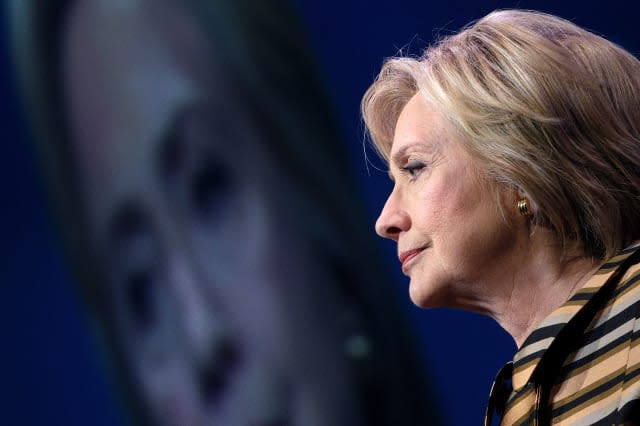Who would be most painful for your portfolio - Clinton or Trump?

The US election seems to have been going on for years.
I realise that the US president is pretty much the most important politician in the world – or certainly the most visible one – but, seriously.
Can they not just compress the whole thing a bit?
Thankfully, it's nearly over. Within the next two months, we'll know who's running the US.
And now's probably as good a time as any to consider the potential consequences for your portfolio...
Trump, Clinton – it's up to the American voter
If you're expecting a rant about one or other candidate this morning, I'm afraid I'll have to disappoint you.
The populists vs establishment narrative is all a lot of fun to pontificate over. But as I've said here before, I think it's all too easy for outsiders (like myself) to miss critical nuances in other countries' elections.
It's all too easy to lump Trump in with "surprise" candidates and populist movements in other countries. But in fact the driving forces for each "anti" movement are quite diverse. Trying to clump them altogether is just poor analysis – it'll lead you up the garden path and it won't make you any money.
For clarity: I don't like Trump. He comes across as a blowhard and an opportunist and he's really not someone whose antics I'd want to see on my TV screen on a regular basis. But I wouldn't fancy voting for Clinton either. The Scottish word "sleekit" probably best describes my impression of her.
Those views might be unfair. As I say, I'm not following the election campaign in minute detail and I don't get to vote in it, so if you want in-depth political analysis, there's plenty of stuff straight from the American papers that you can read online.
But I do think that, whoever gets in, we're in for a bit of a rough time. You've got interest rates at record lows – ie bond prices at record highs – which are a macroeconomic time bomb just waiting to go off. With both candidates considering government spending, it's going to pay to keep an eye on that.
You've got a rising appetite for protectionism and two candidates who are essentially hostile to free trade. That's a risk from the interest-rate point of view – protectionism tends to be inflationary.
And you've got a fraught geopolitical situation. Whoever gets in is going to have to deal with the usual problems of the Middle East, but compounded by Russia, China, and Japan all jockeying for influence under what's perceived (rightly or wrongly) to be an inwardly-turning America – not so much superpower as wallflower.
That's the big picture. But what about the little differences?
The potential winners and losers from the coming US election
David Rosenberg of Gluskin Sheff put together a handy round-up of the stockmarket sectors that might be the biggest winners or losers in the event of either a Clinton or a Trump victory.
By the way, Rosenberg also has a bit of interesting historical perspective on the election. Check out these two quotes (he's got a whole collection of them, but these stood out).
"The fact that he could be deemed a serious candidate for president is a shame and embarrassment for the country."
"That can't be his real hair!"
Clearly, you know these can't be about Trump as I've already rather given the game away. Both were said about Ronald Reagan in 1976 and 1980, apparently. And whatever you think of Reagan, it's not like the world ended under his tenure.
Anyway, back to the point in hand.
Biotech and big pharma – Clinton wants to regulate it tighter, Trump would go easier. So that's a clear loser if Clinton wins. (The US hospital stocks are a different matter, but UK investors are unlikely to be directly invested in those, so I'll not worry about them for now.)
On energy – Clinton is better for alternative energy, while Trump is better for fossil fuels. That said, I'm not convinced that the candidates make much difference here – the oil price is a far more important factor.
They both want to spend more money. If anything, says Rosenberg, Clinton is relatively conservative – fiscally speaking – compared to Trump. More infrastructure spending – be it on a wall or on improving the road network – would be "a plus for the industrials – cement, concrete, steel, machinery".
What's perhaps the most interesting though is that there's one sector that's a clear each-way bet. "Both candidates would be good news for the defence sector", says Rosenberg. "Hillary would pursue a more hawkish foreign policy than her predecessor, but Trump would be even more bullish... because he already has put numbers down on paper – expanding the military via 90,000 new soldiers, nearly 75 new ships requiring up to $90bn a year."
So whoever wins, defence is a winner. It strikes me that if you don't have exposure to the defence sector – both in terms of the "real" world and cyber defence – then now's maybe a good time to start looking.
MoneyWeek regular Jonathan Compton wrote more about the probable boom in defence spending in an issue of MoneyWeek magazine a few months ago. We've also covered cyberwarfare and cybercrime very recently too, along with the best ways to profit from the race to defend against it. You can get your first 12 issues for £12 if you sign up now.



